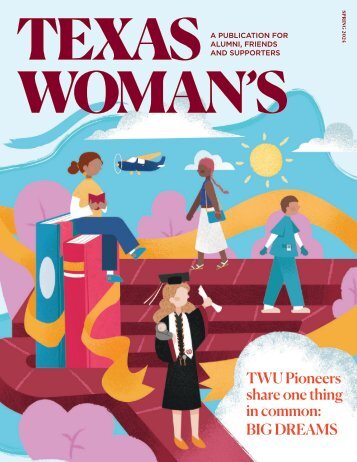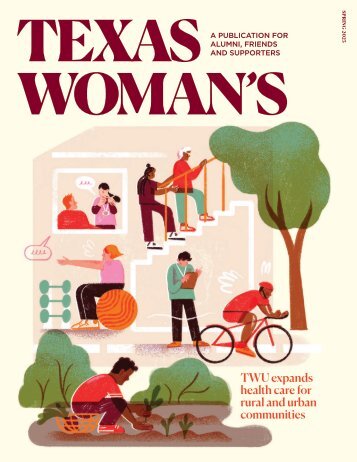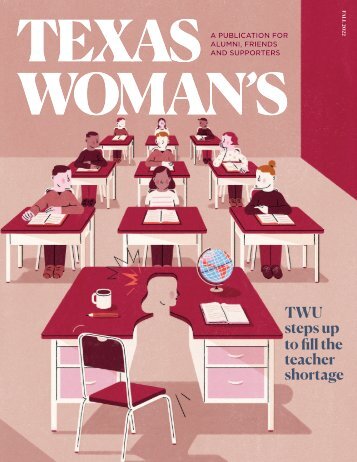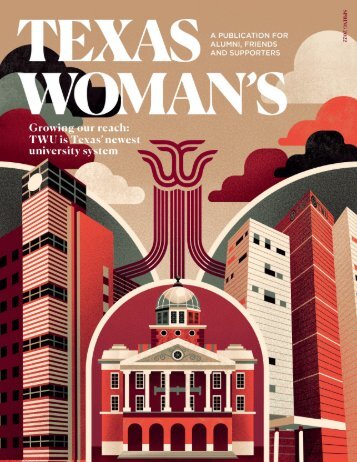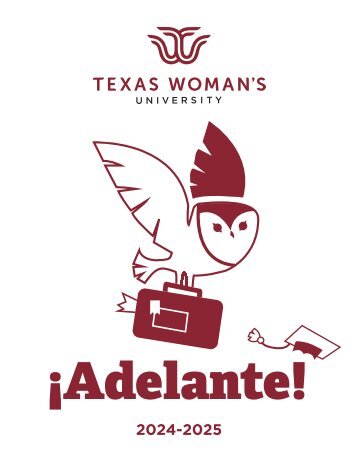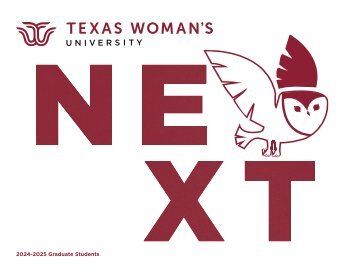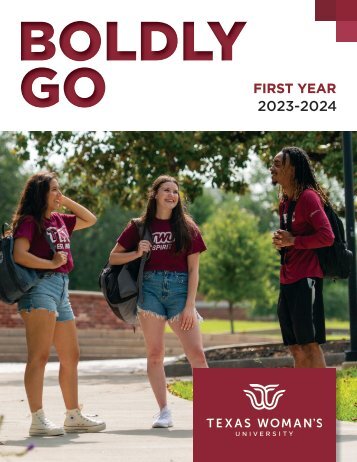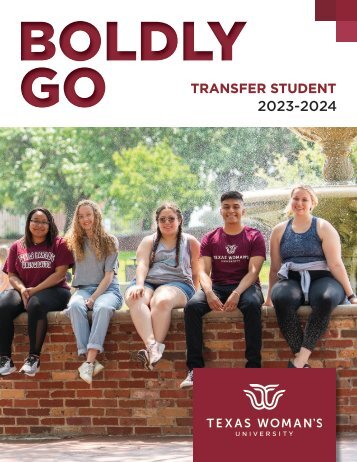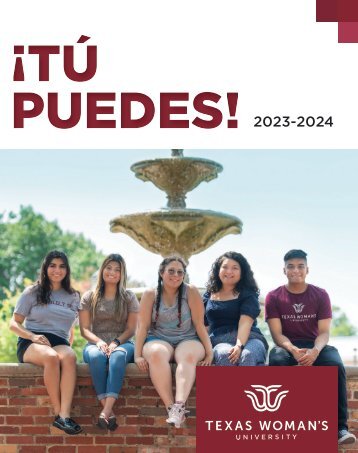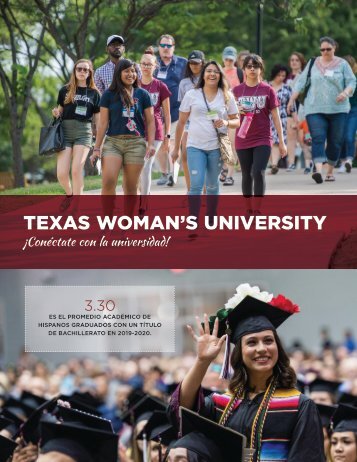Texas Woman's Magazine - Fall 2022
- Text
- Alumni
- Connell
- Literacy
- Denton
- Programs
- Bilingual
- Leadership
- Scholarship
- Acosta
- Educators
What’s the latest
What’s the latest victim of supply-chain scarcity? American schools. NOWADAYS, THE national teacher shortage is hitting close to home. Currently, Texas has 40,000 fewer teachers than needed in public K-12 schools. Some rural school districts have even moved to a four-day school week as a stop-gap measure until they can hire more teachers. Having gained a reputation for training many of Texas’ best educators for over a century, TWU’s College of Professional Education (COPE) has devised innovative strategies to help curb the teacher shortage — and address the larger social implications underlying it. “It’s an ethical and a moral obligation to support public educators,” COPE Associate Dean Gina Anderson noted. “But it’s also absolutely critical for the economic health of our state and our nation.” Public-school leaders applaud COPE’s commitment. “TWU has a long history of preparing outstanding educators for the teaching profession,” said Jamie Wilson, superintendent of the Denton Independent School District. “From its commitment to early literacy to preparation for master’sdegree special educators, TWU’s COPE prepares life-changing teachers for our classrooms.” THE SOCIAL COST Studies show that quality child care and early-childhood education — crucial to social and intellectual development — have a lifelong impact. In fact, youngsters receiving quality early-childhood education and care have better outcomes in adulthood, including career and earning potential. Yet many children are missing out. In addition to the K-12 teacher shortage, preschool and infant care remain understaffed and prohibitively costly. Nearly half of U.S. families live in “child-care deserts,” in which one licensed child-care spot exists for every three children needing one, according to the Center for American Progress. And the numbers can be shocking: The cost of infant child care in Texas exceeds in-state college tuition, as it does in 32 other states, according to the Economic Policy Institute. 2 TEXAS WOMAN’S
These expenses, coupled with the overall lack of regular childcare access, don’t just hold children back but can also disrupt the career trajectory of many parents, particularly women. INVESTING IN HUMAN CAPITAL COPE’s reputation for graduating impactful future teachers is acknowledged by many education leaders, including Amarillo College President Russell Lowery-Hart. “TWU is a long-standing leader in preparing some of Texas’ most inspiring educators,” he said. “Amarillo College and TWU share a strong history of innovation, and I’m honored to continue our partnership in changing student lives.” Even the tenure of TWU’s teachers is noteworthy. Eighty percent of its graduates remain in the teaching profession after 10 years, exceeding the national average of 55% and state average of 50%. “When you look at the data, our candidates are hired, they’re retained, and they’re more successful than other candidates entering the profession,” Anderson explained. COPE also extends its reach by training teachers across the state through community college collaborations, resulting in classroom leaders with local ties that benefit students and communities. COPE’s Educator Preparation program attracts a diverse student body of working professionals and parents who return to gain degrees and credentials. Professional development workshops, hybrid advising and testpreparation tools position these students for success. But other needs exist. THE COSTLY ROAD AHEAD Several significant costs of teacher education arise when graduation is on the horizon. Unpaid student teaching assignments required for state certification include significant in-class time, resulting in thousands of dollars in lost wages. After student teaching comes the state certification exam, costing another ,000 or more in fees. Since many future teachers support their own families, these financial burdens may derail their progress. What’s a better alternative? Provide a living wage for student teachers. If nascent teachers were paid, more could afford to complete their degrees and become certified Texas educators. It could be game changing, a remedy for the dire teacher shortage in Texas. Tackling the issue head on, COPE Dean Lisa Huffman vows to reduce the financial obstacles many student teachers at TWU face. Chancellor Carine Feyten and Associate Dean Anderson applaud Dean Huffman’s — and COPE’s — commitment to public education as a democratic ideal. “Texas will benefit economically from the investment in teachers,” Anderson said. “There has never been a more important time as a collective community for us to uplift, recognize, celebrate and invest in quality educator preparation.” 50 Years of Bilingual Education TWU has boosted Spanish-language competencies for 50 years and counting The brainchild of leading educators, TWU’s bilingual education programs date back to 1969. Then, as now, the college’s education experts focused on field experience and small class sizes to pioneer the best teaching practices. The former Bilingual Education Centro de Acción (BECA) prepared students for more than half a century with native Spanish-speaking instructors and experiential learning opportunities. The legacy continues today. TWU has forged ahead for decades to train teachers to better reflect the state as a whole. Here’s how: The Reading Recovery program, a part of COPE’s department of Literacy and Learning, began in 1989 to promote early literacy and prevent literacy gaps among first graders. This TWU program is one of two in the nation for educators. Descubriendo la Lectura is the only Reading Recovery program in the world that offers training in Spanish. Since 1997, participating students have received intensive, individualized instruction in Spanish from certified bilingual teachers. Project PIONERAS is a .2 million scholarship and research project that began in 2016. It enhances Spanish-language competencies, content and pedagogical knowledge, and familyengagement skills for undergraduates and teachers in bilingual classrooms. Project HELP (Hispanic Educators Leading the Profession), which began in 2019, provides scholarships to help cover tuition and fees for the final four semesters at TWU. Federal funding enables TWU to partner with community colleges statewide so that Hispanic future teachers can transfer and complete their education degrees at TWU. Project LEAMOS, which began in 2022, is a one-year grant that enables 40 educators to earn an M.A. in multilingual and multicultural studies. Learn more Contact Dean Lisa Huffman at LHuffman1@twu.edu TEXAS WOMAN’S 3
- Page 1 and 2: A PUBLICATION FOR ALUMNI, FRIENDS A
- Page 3: INSIDE 6 THE WOMAN BEHIND ROE V. WA
- Page 7 and 8: QWorking for the Super Win-win What
- Page 9 and 10: “TWU will always have a special p
- Page 11 and 12: institution. Women, she said, “ha
- Page 13 and 14: RESEARCH THAT MATTERS Learn how you
- Page 15 and 16: PLANNING TO MAKE A DIFFERENCE PAYIN
- Page 17 and 18: BOLDLY GO > A BRIGHT FUTURE A gradu
- Page 19 and 20: THE U.S. DEPARTMENT OF VETERAN'S AF
- Page 21 and 22: ALUMNI ENGAGEMENT Alumni Global Net
- Page 23 and 24: ASHLEY DAME ’12 AND NATHAN DAME
- Page 25 and 26: THE BLOOMBERG TRADING AND ANALYTIC
- Page 27 and 28: GLADYS ACOSTA ’18, ’23 Bilingua
Inappropriate
Loading...
Mail this publication
Loading...
Embed
Loading...
Chancellor Office Publications
Texas Womans Magazine
Current Viewbooks
Viewbook Archive
Texas Woman's University
304 Administration Dr.
Denton, TX 76204
940-898-2000
© 2021 Texas Woman's University




